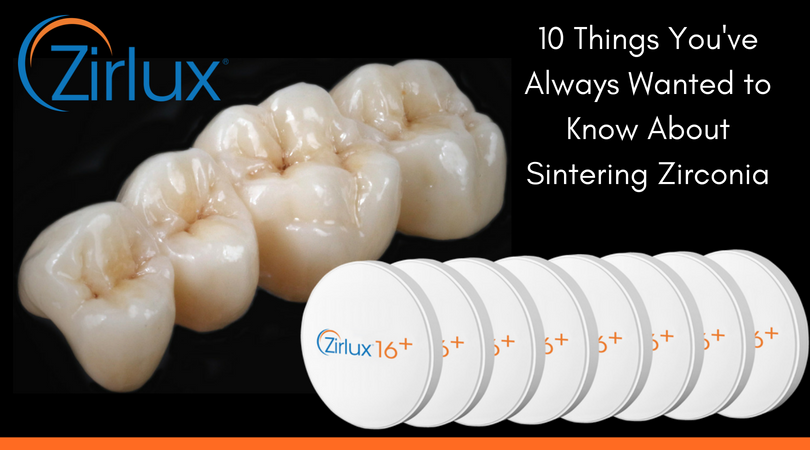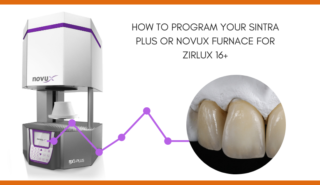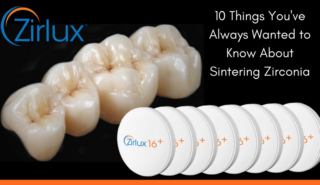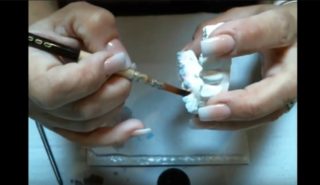
Here’s a part two follow up to the Zirlux 16+ webinar, Coloring a Full Arch. We put together a list of questions from the Q&A portion with Pamela Hanneman, CDT.
Pam has been a technician for 23 years and worked with Zahn Dental as a training and education manager as well as getting to test and vet new products to implement in laboratories. She is currently Custom Milling Center’s production manager.
Here’s a list of the top 10 questions she receives regularly regarding sintering zirconia.
Q: Can the zirconia crowns be touching slightly when going in the furnace or should there be space between them?
A: There should be a small space in between them. That is what the manual recommends and that’s what we do at CMC. Sometimes during the sintering cycle, the crowns will roll and touch each other, but we have had no issues of them touching so far in terms of quality.
Q: How do you feel about beadless trays?
A: I have tested them and they work great. Trays with beads and without work equally well.
Q: I noticed in the manual for the Sintra Plus that they recommend changing the elements after 2000 hours. Do you do that?
A: We have pushed our ovens for much longer than that and our results are still good. So if you like the results you are getting then you’re good. If the results start to deteriorate then I will start looking at my elements. The buildup on the MoSi2 is obvious, and it is also obvious if it cracks/breaks.
Q: On the Sintra Plus is there a calibration cycle pre-programmed or could you go over how to calibrate again?
A: There is a program that is pre-programmed in the Sintra Plus. You can view the program and press ‘enter’ or you can press ‘alter program’ to change it. The recommended purge cycle is: 25C to 1600, hold it for 4 hours, heat rate down 25C to 350, and natural cool after that.
Q: I am considering buying a milling system. Does placement of the sintering oven matter? For example, ventilation, compressor, etc.?
A: There is no odor or anything toxic that’s released from the ovens so we don’t need ventilation or a hood. We keep our sintering ovens in a sectioned off area, we’re careful to not have anything flammable around them, and each oven is plugged into its own power source.
Q: Can we sinter single units and 6 units or larger at the same time?
A: Yes. Always use the program for the large bridge. It won’t affect the single unit.
Q: Do you primarily use the 4 hour cycle? We still use the overnight ~9hr cycles, can we achieve identical or almost identical quality with a 4 hour cycle? We primarily manufacture single units and small bridges.
A: We tested the 4 hour cycle on zirconia many times, and the results are great. We still use the 7-8 hour cycle primarily because most of our sintering happens overnight.
Q: For the Sintra Plus, what maintenance do you recommend? We know we need to run purge cycles, but aren’t sure what purge cycle to use, how long it should take, and how often to do it?
A: It really depends on your lab. I would recommend starting with once a week. Run up the temperature to 1600 and hold up to 4 hours and cool. Add your scrap white zirconia into the tray. If that disc comes back down completely white then you know you didn’t have that many contaminants up there. If it comes down discolored then I like to personally run another cycle until I see the disc is white.
Q: Do you use air cooling (the air tubes that come with it)? Does that just allow you to cool faster and take the units out sooner?
A: We do not use air cooling. We do not recommend doing this because we believe that it may harm the quality of the unit.
Q: Does the room temperature affect the sintering oven? Would the quality of the crown be compromised?
A: Yes, absolutely. We ran into this problem a while back. We kept the ovens in a room below 50 degrees and the ovens did not heat up properly. I would recommend keeping the ovens in a room that is above 50 degrees.
In case you missed part one of the Zirlux 16+ webinar follow up on staining and glazing, you can read it here!



